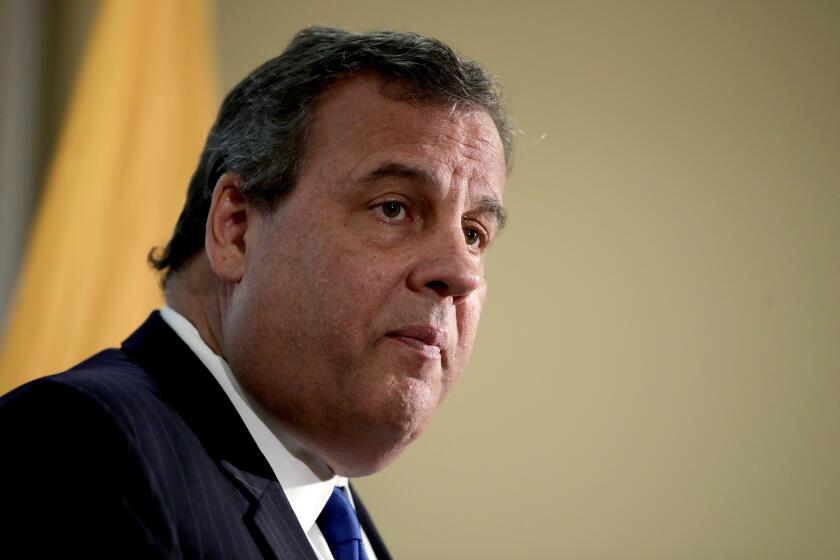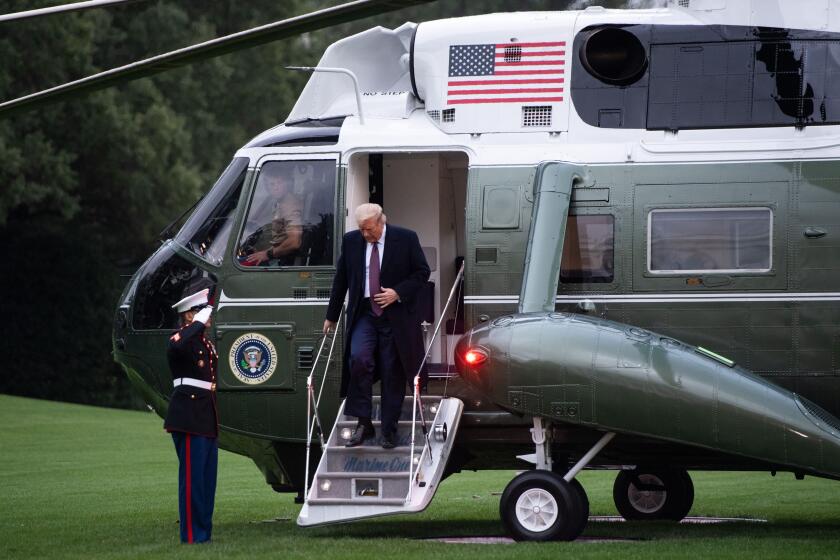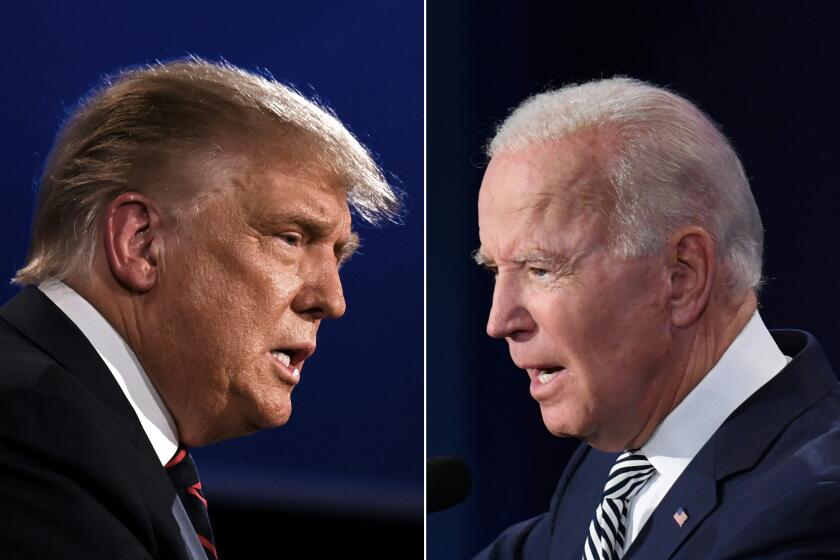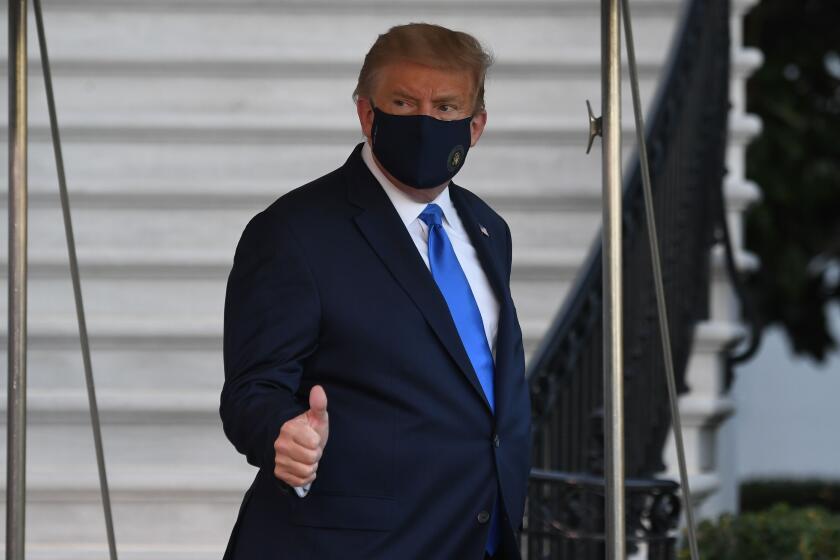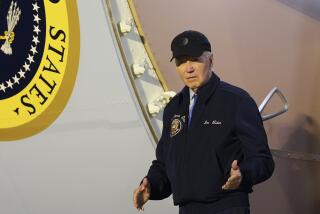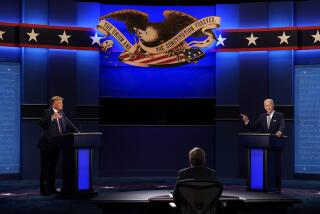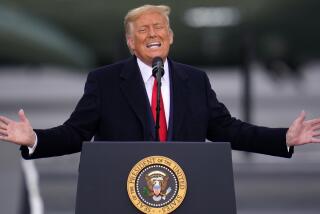Q&A: Your questions about Trump’s COVID-19 diagnosis answered

President Trump said early Friday that he had tested positive for the coronavirus and that he and First Lady Melania Trump would begin the “quarantine and recovery process immediately.” Trump’s illness could have significant repercussions for the 2020 presidential campaign.
Trump’s positive test came just hours after the White House announced that senior aide Hope Hicks, one of the president’s closest advisors, had tested positive Thursday after several days of traveling with the president.What happens if Trump dies?
Although Trump aides said he was showing only minor symptoms on Friday morning, by the afternoon he had been flown to Walter Reed Medical Center.
White House Press Secretary Kayleigh McEnany said Trump was going to the hospital only “out of abundance of caution, and at the recommendation of his physician and medical experts.”
If the situation becomes dire, both the Democratic and Republican parties have rules for how to choose a new candidate if their nominee dies or withdraws before the election.
With about a month until election day, however, ballots have already been printed and early voting has begun, said UC Irvine law professor and voting expert Rick Hasen.
“What’s most likely [is] that the election would take place on time with the deceased or incapacitated candidate’s name on the ballot,” Hasen wrote in a post on his Election Law Blog, “and then there would be a question if legislatures would allow presidential electors of each state to vote for someone other than the deceased candidate.”
Not every state has laws addressing this possibility, leading to more uncertainty.
“If we are unfortunate enough to have a presidential candidate die or become incapacitated this close to the election, what happens next is likely to be uncertain and messy,” Hasen said in an interview. “It could leave room for political gaming as well under the arcane rules of the electoral college.”
Follow along here for the latest about Trump’s positive coronavirus test and what the news means for the presidential campaign.
If Trump gets sick or is hospitalized for an extended period, can the election be postponed?
No U.S. presidential election has ever been postponed, even during the Civil War, World War II and other times of national crisis. The Constitution restricts the president and vice president to four-year terms.
The election would need to be held by Jan. 20, or constitutional rules of succession would apply. House Speaker Nancy Pelosi (D-San Francisco) is next in line. What symptoms does Trump have?
White House Chief of Staff Mark Meadows said Friday that Trump had “mild symptoms” but did not specify what they were. “He continues to not only be in good spirits, but also very energetic,” Meadows said at a briefing.
In a letter Friday afternoon, White House physician Sean P. Conley said Trump received a single 8-gram dose of Regeneron’s polyclonal antibody cocktail as a precautionary measure. He’s also been taking zinc, vitamin D, famotidine, melatonin and a daily aspirin, Conley said.
“As of this afternoon the president remains fatigued but in good spirits,” Conley said. “He’s being evaluated by a team of experts, and together we’ll be making recommendations to the president and first lady in regards to next best steps.”
On Friday evening, Trump was taken to the hospital. Trump would be “working from the presidential offices at Walter Reed for the next few days,” McEnany said.
Melania Trump had a mild cough and headache, the press secretary said.
Is Trump at greater risk of severe COVID-19?
Trump’s age, sex and weight status increase his risk of developing a severe case of COVID-19.
According to a report in June from Trump’s physician, the president is 6 feet, 3 inches tall and weighs 244 pounds. That means his body mass index, or BMI, is 30.5, just over the threshold for obesity.
President Trump has risk factors that make him more likely to experience a severe case of COVID-19, including his age, sex and obesity.
Since the early days of the pandemic, researchers have observed that COVID-19 patients who are obese fare worse than those who are not.
Compared with young adults between the ages of 18 and 29, a person between the ages of 65 and 74 is five times more likely to be admitted to a hospital and 90 times more likely to die of the disease.
Other data from the U.S. Centers for Disease Control and Prevention indicate that, among COVID-19 patients in their 70s, the death rate for those who were in good health at the time of their infection was 10%. For those already dealing with a medical condition, the death rate was 32%.
A study published in July by the CDC reported that COVID-19 deaths in men outnumbered deaths in women in 41 out of 47 countries assessed.
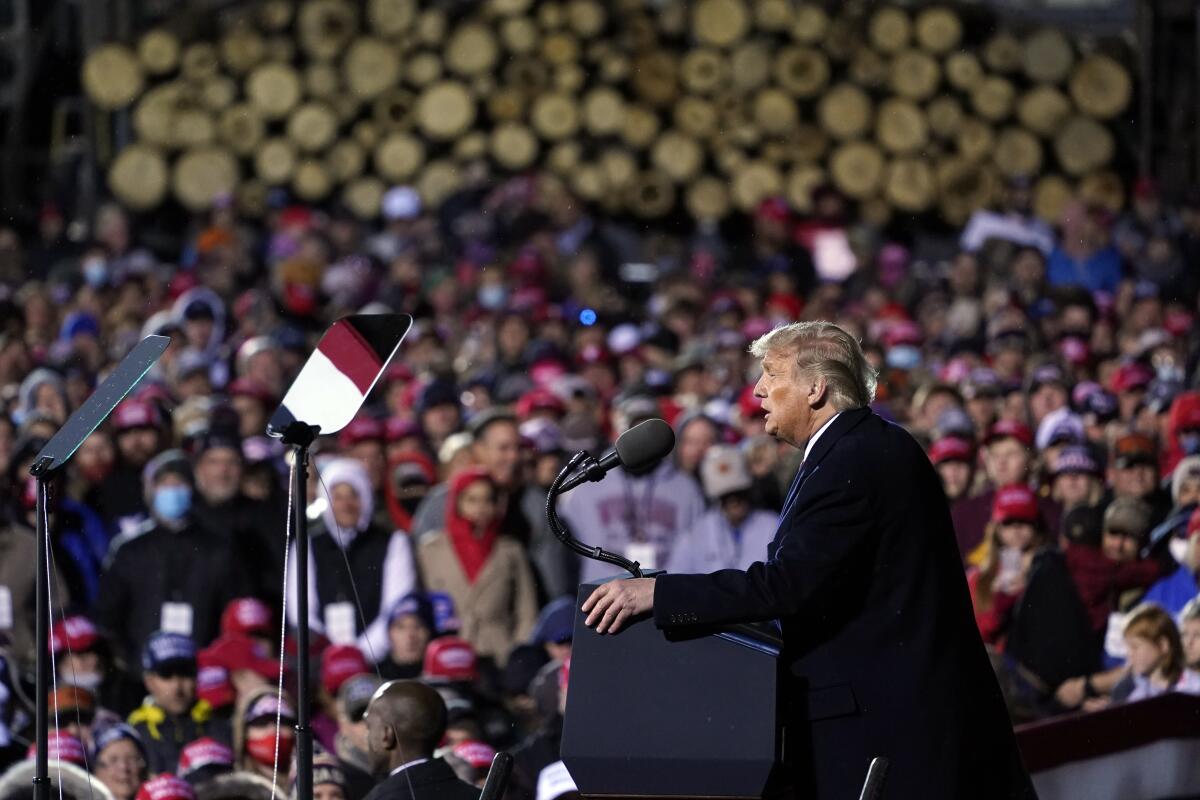
What has Trump said about COVID-19?
Trump has downplayed the threat from the disease, which has killed more than 208,000 people in the U.S. As recently as Tuesday night’s debate with former Vice President Joe Biden, Trump defended his campaign rallies, many featuring thousands of his maskless fans crammed together. He falsely stated that his rallies were all outside.
“So far, we have had no problem whatsoever,” Trump said. “It’s outside. That’s a big difference, according to the experts. We do them outside, we have tremendous crowds. … We’ve had no negative effect.”
He held an indoor rally as recently as Sept. 14, in Nevada, and also one in Tulsa, Okla., in June. He also attended an indoor fundraiser on Thursday, after officials had learned of Hicks’ diagnosis.
During the debate, Biden argued that Trump was underplaying safety measures, including the value of wearing a mask. He noted that the head of CDC has said 100,000 lives could be saved by January if Americans increase their mask usage.
“It matters,” Biden insisted.
Trump retorted: “And they’ve also said the opposite.” To which Biden responded: “No serious person said the opposite.”
Trump mocked Biden for holding socially distanced events with smaller groups of voters, and for usually wearing a mask, per public health guidelines.
“Every time you see him he’s got a mask,” the president said. “He could be speaking 200 feet away, and he shows up with the biggest mask I’ve ever seen.”What safety precautions were taken during the presidential debate?
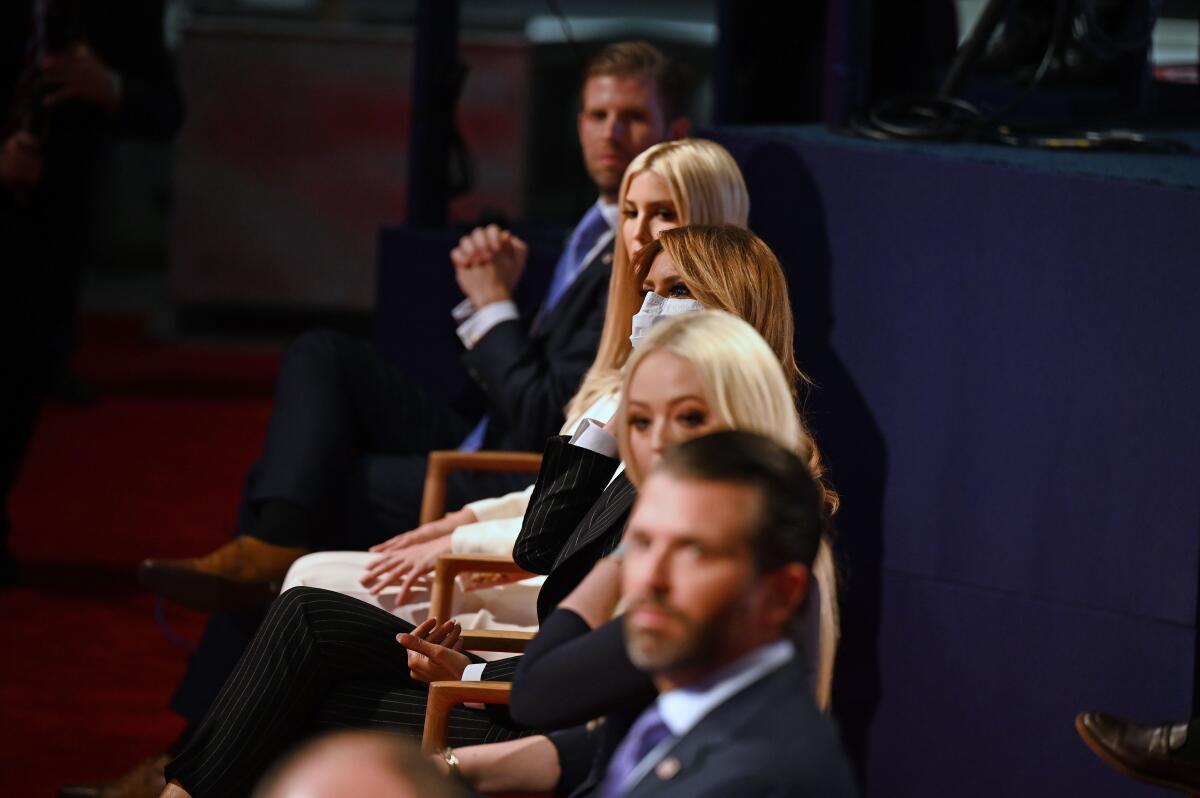
There were several requirements in place at the debate hall in Ohio, including temperature checks, hand sanitizing, social distancing and masking, according to the Cleveland Clinic, the health advisor to the Commission on Presidential Debates.
The clinic stated it believes there is “low risk of exposure to our guests” but is reaching out to address any questions or concerns. Those allowed inside the debate hall tested negative for COVID-19 before entering, according to the clinic.
“Individuals traveling with both candidates, including the candidates themselves, had been tested and tested negative by their respective campaigns,” the clinic said in a statement.
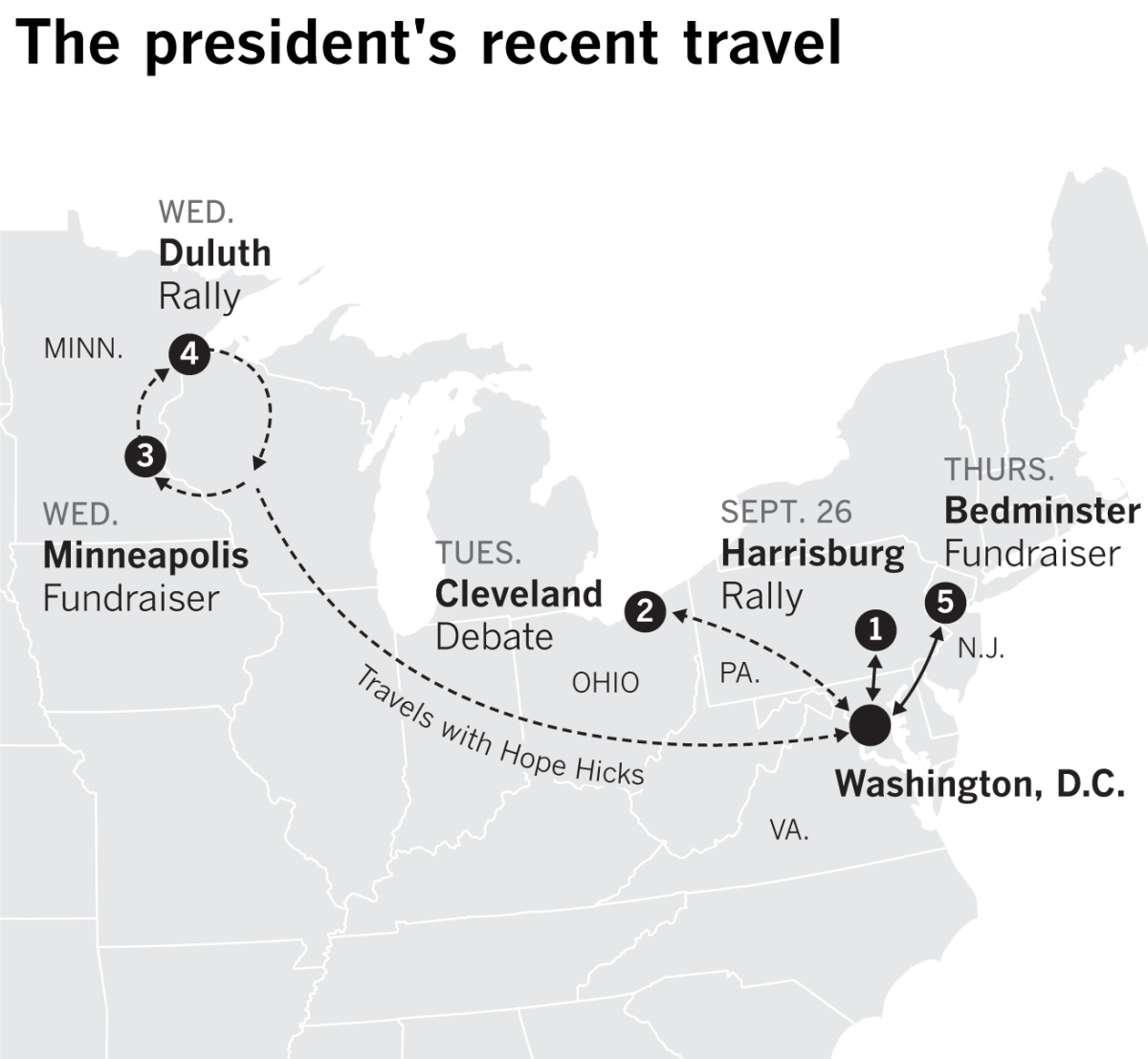
Although attendees entering the hall were masked, the clinic stated, some removed their masks once they were seated.
“A Cleveland Clinic physician did offer audience members masks, but some did not adhere to the requirement,” a spokeswoman said. Trump’s family members were among them.
“The first family came in wearing masks, but they took them off,” moderator Chris Wallace said on Fox News. “Members of the Cleveland Clinic came up to them and said ‘if you need a mask’ and they waved them away.”
What about the upcoming debates?
The vice presidential debate on Oct. 7 will continue as scheduled, according to Frank Fahrenkopf, co-chairman of the Commission on Presidential Debates.
“As far as we know, we’re going forward,” he said. “Both campaigns have said they’re proceeding.”
Both Vice President Mike Pence, who met with the president on Tuesday, and California Sen. Kamala Harris, the Democratic nominee, tested negative for the coronavirus on Friday.
In a memo, Pence’s physician said that the vice president “is not considered a close contact with any individuals who have tested positive for COVID,” including the president, and did not have to quarantine.
Pence “remains in good health and is free to go about his normal activities,” Navy Lt. Cmdr. Dr. Jesse Schonau said in a statement.
During a rally on Tuesday, Pence told the crowd he had met with the president in the Oval Office that day. People who have been in “close contact” with someone who has COVID-19 should be quarantined, which means staying away from others until they know if they’ve been infected, according to public health officials.
The CDC defines close contact as being within six feet of someone who has COVID-19 for 15 or more minutes; providing care to someone with the disease; having direct physical contact with an infected person, such as through a hug or a kiss; sharing eating or drinking utensils; or being sneezed or coughed on by the infected person.
Even if you test negative for COVID-19 or feel healthy, you should stay home (quarantine) since symptoms may appear two to 14 days after exposure to the virus, according to the CDC.
A little less clear is the status of the second presidential debate, scheduled for Oct. 15.
The University of Utah remains ready to host the debate, said university spokesman Chris Nelson. No one will enter the media filing center or debate venue “without having had a negative COVID19 [test] within a day of entering the area.” There is a mask mandate inside any building or tent, as well as a requirement for physical distancing, Nelson said.
“It is our campus expectation and guideline that anyone in one of our buildings wear a mask [except the two candidates and moderator on stage who will be physically distanced],” he said. He said the university would be in communication with the commission on enforcement of that requirement.
“In terms of campaign staff, CPD staff, or family members of the candidates we would work in partnership with the CPD to determine next steps,” he said.
Trump’s campaign said in a statement that previously announced events involving the president are being moved to virtual events or being postponed. Other campaign events would be considered on a “case-by-case basis.”
Fahrenkopf said a decision on the second debate will probably come down to whether the president is still sick at that time.
“It’s too early to say,” he said.
After mocking Biden for wearing a mask, the president is diagnosed with COVID-19. The pandemic is back in full focus.
How will this affect campaigning?
The immediate impact of the illness will be to keep Trump off the campaign trail, possibly preventing him from participating in the scheduled Oct. 15 debate. The former vice president tested negative twice on Friday.
Trump is unlikely to be able to stage the kind of rallies that have energized him and his most loyal supporters. On Friday, his campaign announced that scheduled events involving the president and his family were “being moved to virtual events or are being temporarily postponed.” Fundraisers that had been scheduled next week in Orange County and Beverly Hills were canceled.
How could Trump’s diagnosis alter the 2020 race?
Political experts say Trump’s diagnosis will pose a political challenge, refocusing the nation and the 2020 campaign on his response to the pandemic, an issue on which the president has received low marks from voters. The president has already consistently trailed Biden in polling.
“The consequences of this will be disastrous for Trump’s already flagging reelection campaign,” Alan Abramowitz, Emory University’s national polling and election forecasting expert, said in a statement. “Even if he avoids a serious illness, he will be forced off the campaign trail for a considerable length of time and the questions about his handling of the pandemic and his personal behavior in relation to it will intensify.”
President Trump was hospitalized at Water Reed on Friday evening after suffering symptoms of COVID-19. Vice President Mike Pence tested negative.
What happens if Trump’s condition deteriorates? What is the transition of power?
Pence’s negative test for the coronavirus Friday, alleviated some immediate concerns about the presidential line of succession if Trump becomes badly ill and is unable to perform his duties.
According to the 25th Amendment to the Constitution, when a president determines that he can’t carry out his duties, he informs the speaker of the House and the president pro tempore of the Senate, in writing, of his incapacity. While he’s incapacitated, the vice president serves as acting president. Pelosi is the speaker; Iowa Republican Charles E. Grassley is the Senate president pro tempore.
If a president can’t certify his own incapacity, the amendment allows the vice president and a majority of Cabinet secretaries to inform the speaker and the president pro tempore. In that case, the vice president would immediately take over as acting president.
If the president disputes the matter, the vice president and a majority of Cabinet secretaries must again declare the president incapable, in writing, within four days. Congress must then convene to decide the issue, and a two-thirds vote of both chambers is required to declare the president unable to exercise his authority.
More to Read
Get the L.A. Times Politics newsletter
Deeply reported insights into legislation, politics and policy from Sacramento, Washington and beyond. In your inbox three times per week.
You may occasionally receive promotional content from the Los Angeles Times.
